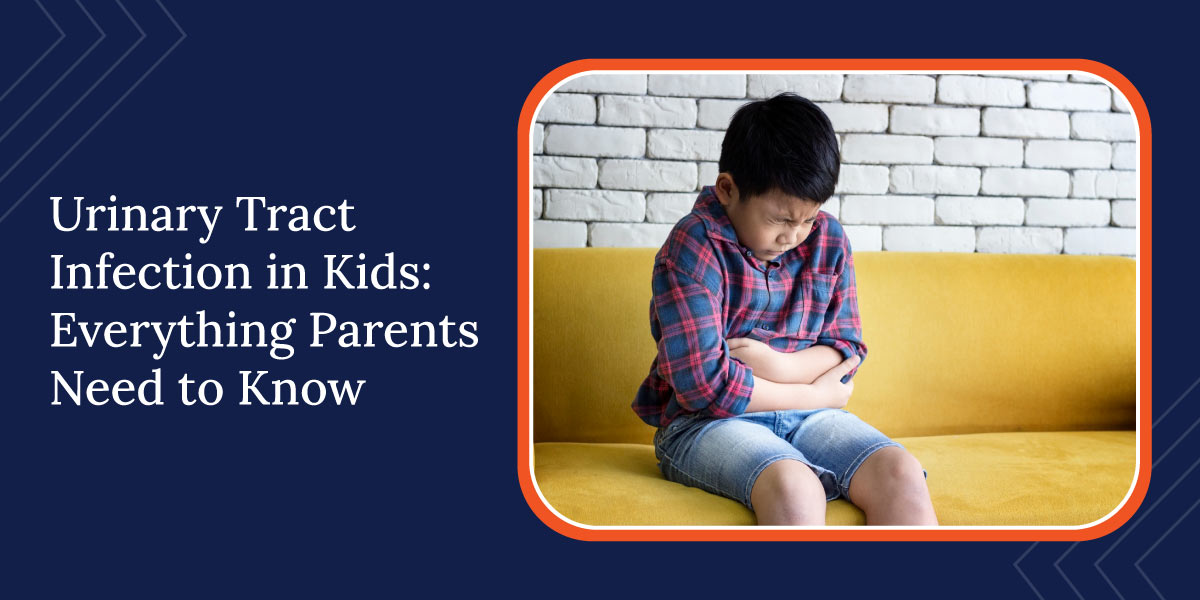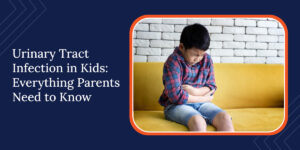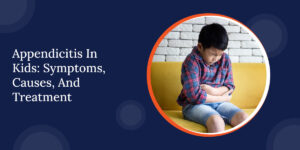A urinary tract infection (UTI) is an infection in any part of the urinary system. While commonly associated with adults, UTIs are a surprisingly frequent health issue in children. In fact, they are the most common bacterial infections in childhood, affecting millions of young lives worldwide. This is because the symptoms are not specific, particularly in infants, and therefore, parents may not be able to detect the problem early. This guide aims to empower you with the essential knowledge to recognise, manage, and prevent a urinary tract infection in kids, ensuring your child gets the timely and professional care they need.
A] What is a Urinary Tract Infection (UTI)?
In simple terms, a urinary tract infection (UTI) is an infection of the urinary system, which includes the kidneys, ureters, bladder, and urethra. When bacteria enter this system and multiply, it can lead to an infection. A UTI can be categorised as a lower UTI (cystitis), which affects the bladder and urethra, or a more serious upper UTI (pyelonephritis), which involves the kidneys. Most UTIs are caused by bacteria from the child’s own digestive tract, most notably E. coli, which travel up the urethra..
Protect Your Child’s Health – Learn About UTIs Today
B] Causes of UTIs in Children
Understanding the causes of a urinary tract infection in kids is the first step toward prevention. Parents often ask, ‘What causes a urinary tract infection in a child?’ While multiple factors play a role, the primary source is bacteria, especially E. coli, that move from the bowel into the urinary tract. However, several other factors increase the risk:
- Poor Hygiene:
- Many baby urine infection symptoms are linked to hygiene practices. It is more susceptible to girls, especially since bacteria can easily pass through the anus to the urethra.
- Following the right wiping technique, front to back, is essential to avoid infection.
- For infants and toddlers, changing diapers frequently eliminates the moisture buildup, which prevents bacterial growth that can trigger UTIs.
- Anatomical Factors:
- Women have a shorter urethra, which makes it easier for bacteria to travel into the bladder.
- Some children are born with urinary tract abnormalities, such as vesicoureteral reflux (VUR), where urine flows backwards from the bladder to the kidneys, which increases the risk of infection.
- Other Factors:
- Children who often hold urine for long periods increase their infection risk. Stagnant urine allows bacteria to multiply.
- Constipation puts pressure on the bladder, preventing it from emptying fully.
- Bubble baths or harsh soaps may irritate delicate genital skin, altering the natural balance and allowing bacteria to enter.
By considering all these causes of UTI in children, parents can take practical preventive steps alongside medical supervision.
C] Recognising the Symptoms: A Guide by Age
Recognising urine infection symptoms in kids can be tricky because symptoms vary greatly depending on a child’s age. Parents need to be highly vigilant and look for a combination of signs.
Infants (0-12 months):
-
- Persistent fever with no clear cause.
- Irritation, fussiness, and constant crying may occur.
- Poor feeding, vomiting, or refusing milk could indicate infection.
- Strong or foul-smelling urine is another red flag.
Toddlers and Preschoolers (1-5 years):
-
- Pain or burning during urination.
- Sudden urgency to urinate or going to the toilet very frequently.
- Foul-smelling or cloudy urine.
- Complaints of stomach or pelvic pain.-
- New bedwetting episodes, even in children who were previously dry.
Older Children (6+ years):
-
- Older kids usually show more classic UTI symptoms in kids, similar to those seen in adults:
- Burning sensation, frequent urination, or difficulty passing urine.
- Fever and chills may suggest that bacteria have travelled higher up the urinary tract.
- Lower back or side pain, which could indicate a kidney infection (urgent diagnosis required).
By being aware of these age-specific signs and baby urine infection symptoms, parents can seek medical attention in time.
D] Treatment for UTIs
Antibiotic is the basic urinary tract infection treatment for children in Dubai. To avoid recurrence and resistance, parents should make sure that the child takes the full course of antibiotics, even where the symptoms improve early.
Alongside antibiotics:
- Doctors may suggest analgesics such as paracetamol (acetaminophen) and ibuprofen to manage discomfort.
- Hydration is essential; drinking as much water as possible will flush bacteria out of the system and help children recover faster.
E] When to See a Doctor Immediately
Although the majority of infections are mild and manageable, parents have to be aware of red flag symptoms that require immediate paediatric attention:
- High fever, especially in infants under 3 months old.
- Severe back or side pain, pointing to kidney involvement.
- Persistent vomiting or dehydration, where the child produces little to no urine.
- Symptoms that do not improve after 48–72 hours of appropriate treatment.
- Quick medical intervention ensures complications such as kidney damage are avoided.
Protect Your Child’s Health – Learn About UTIs Today
Conclusion
Early detection and timely management are essential to prevent any long-term complications of tongue-tie. If you have been wondering, how does tongue tie affect your child’s well-being? The answer is simple; it can interfere with feeding, speech, growth, and confidence well into childhood. Consult Dr Bhushan Rao, an experienced paediatric surgeon in Dubai, to give your baby the most effective and compassionate treatment. For expert guidance and treatment, contact him today and make the initial step towards a healthier, happier future for your child.

Dr. Bhushanrao Jadhav
Dr. Bhushanrao Jadhav is a highly skilled Pediatric Surgeon and Urologist specialising in minimally invasive and robotic surgeries for children. With advanced training from leading institutions in the UK, India and USA, he brings expertise in treating complex genitourinary conditions and neonatal surgical ailments. Driven by compassion and innovation, Dr. Jadhav has pioneered pediatric robotic surgery programs in Pune, India, ensuring world-class care tailored to children’s unique needs.





















